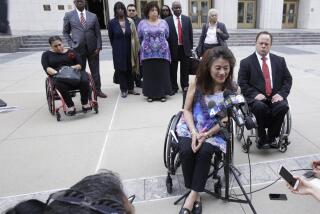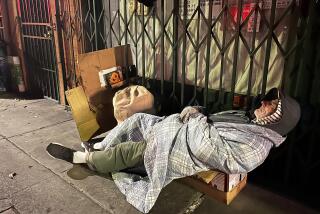Census Method Suit Clears Legal Hurdle
- Share via
NEW YORK — A lawsuit that would change how the U.S. Census Bureau counts urban poor, potentially increasing financial aid and political power for Los Angeles and other large cities, cleared an important hurdle Friday when a federal judge here refused to dismiss the case and agreed with one of its fundamental claims.
In his ruling, U.S. District Judge Joseph M. McLaughlin said that “the census has consistently under-counted the minority population.” Moreover, the judge said it was clear that an under-count in states with large minority populations would result in a loss of political representation.
“I am very happy with the ruling today,” said Deputy City Atty. Jessica Heinz, who reresented the city of Los Angeles. “Now, we can get down to the real fight.”
The next stage in the lawsuit will be a hearing, set for July, when the plaintiffs will present their case on how the Census Bureau should revise its methods and lawyers for the federal government will attempt to discredit the proposed revision.
“It is a classic battle of experts,” the judge said Friday. “The plaintiffs at this juncture sustained their argument.”
McLaughlin rejected the argument, made by the federal government, that the proposed revisions in methodology would require major changes and jeopardize the Census Bureau’s mandate to present a finished census to President George Bush on Dec. 31, 1990.
“It is not Congress’ intent to sacrifice accuracy for the sake of timeliness,” he said.
The 1990 census taking is scheduled to begin next March.
The lawsuit is an effort by a group of state and local governments--among them the city of Los Angeles, the state of California, New York City and state, Chicago and Dade County, Fla.--to gather a more accurate count of the millions of homeless people, illegal aliens, non-English speaking immigrants, transient black men and other people, mainly poor, who are prone to be missed by the census takers.
Those bringing suit argue that the populations of many large cities are under-counted by 5% or more. By adding under-counted residents to the population rolls, the plaintiffs argue, cities and states would receive substantially more financial aid as well as increased political representation.
“For Los Angeles,” L.A. City Councilman Richard Alatorre said Friday, “the stakes are tens of millions of dollars that we lose every year and up to two more congressional seats that we would get.”
Alatorre said the city now receives about $280 million annually from the state and federal governments, much of the money based on general population and the number of low-income residents.
Controversial Technique
Even before the lawsuit was filed last November, population research experts were predicting that growth in California would lay the foundation for five or six new congressional districts.
According to the lawsuit, a more complete census could be conducted if the Census Bureau agreed to use a novel and controversial technique. The technique was developed by bureau personnel over the last decade, but rejected by the Reagan Administration.
It would take the form of a post-census survey, and is designed to pick up people missed by the census takers’ first enumeration. The method would be to supplement the traditional head count with a form of random sampling.
Survey Targets
As proposed, the survey would canvass 300,000 households, reflecting the American society as a whole, immediately after the census. Among the survey targets would be city neighborhoods where the census is considered most likely to miss people.
The results of the initial head-count and the canvass then would be compared; the percentage difference between the two counts would be projected to other similar areas and, ultimately, provide the basis for adjusting the nationwide census.
Advocates said the additional survey would find citizens that, for a variety of reasons, are often uncounted in the districts of urban poor.
But critics of the new method argue that the post-census survey would be as vulnerable to error as the initial census.
The lawsuit is not the first time the Census Bureau has faced legal challenges by cities and states that are convinced they have gotten short shrift. But this is the first time the bureau has found itself arguing against its own experts.
Officials Resigned
Two veteran bureau officials who helped refine the new technique resigned after it was rejected, and one of them, Barbara Bailar, a former assistant director of the Census Bureau, has provided written testimony in support of the lawsuit to force adoption of the new technique.
Bailar accused the Reagan Administration of playing politics when it rejected the post-census survey method.
Big cities tend to be Democratic, and adding poor people and minorities to the population rolls of big cities serves to enhance their political strength.
Clifford reported from Los Angeles and Goldman from New York.
More to Read
Sign up for Essential California
The most important California stories and recommendations in your inbox every morning.
You may occasionally receive promotional content from the Los Angeles Times.










